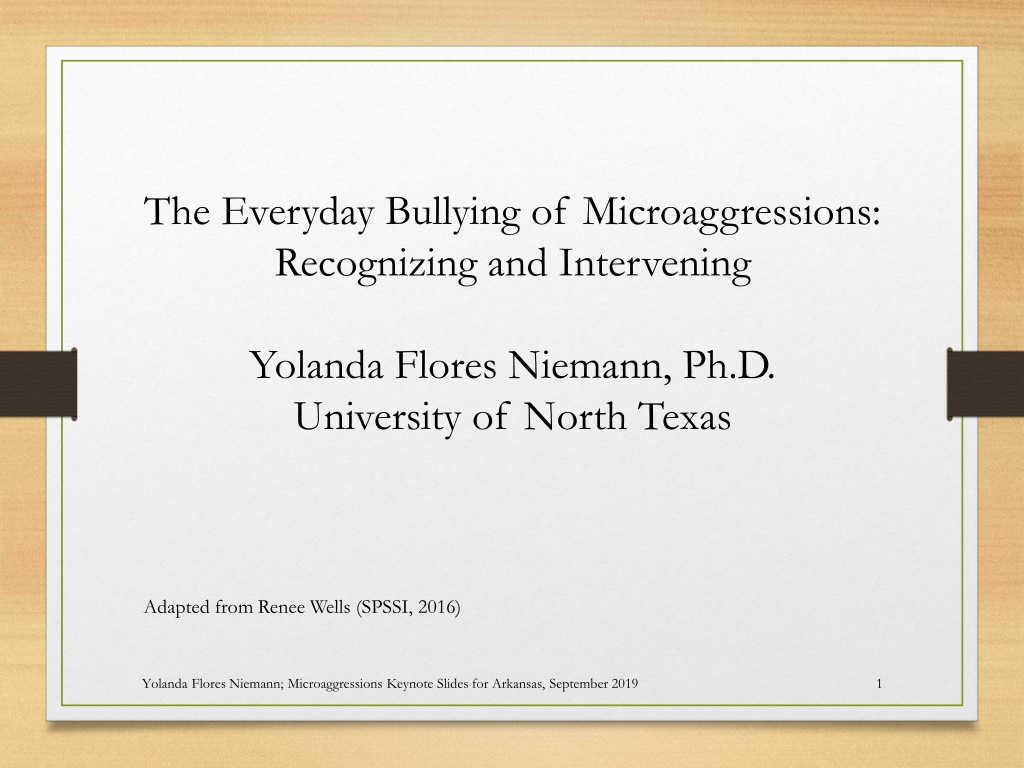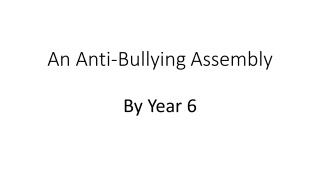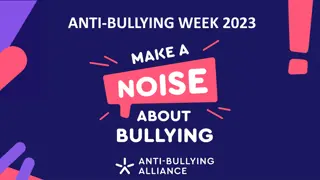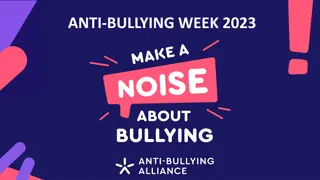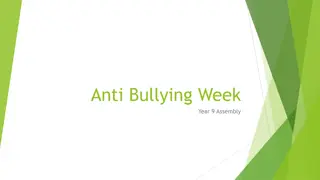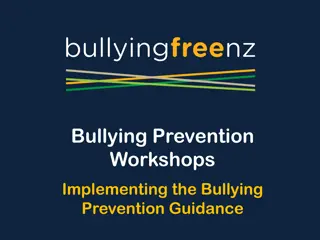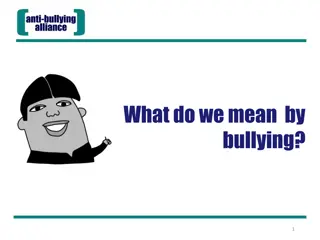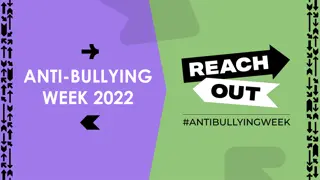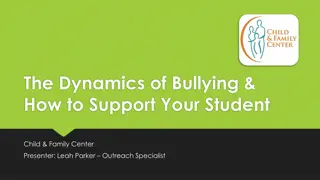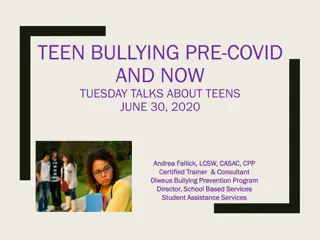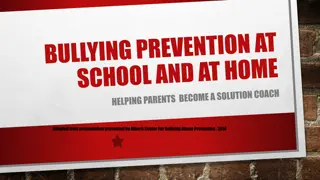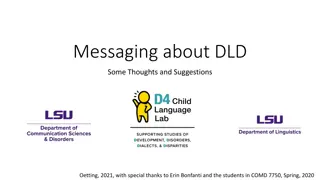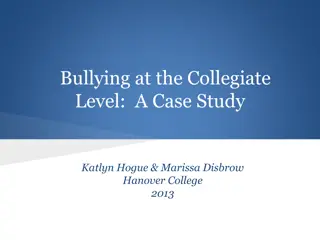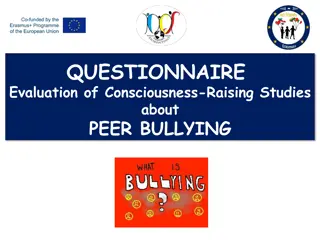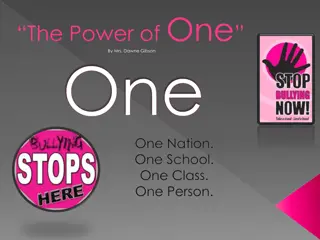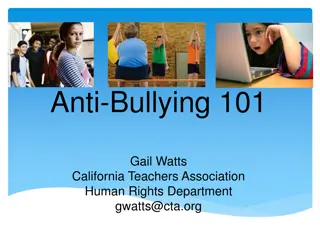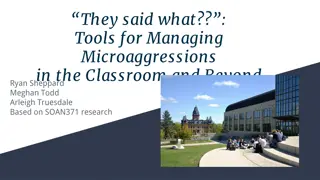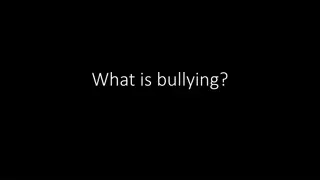The Everyday Bullying of Microaggressions: Recognizing and Intervening
Understanding microaggressions, their impact on identity, and interventions to combat everyday forms of bias. Explore the manifestations of bias through verbal, behavioral, and environmental cues, and learn to recognize microinsults that convey hurtful messages based on stereotypes.
Download Presentation

Please find below an Image/Link to download the presentation.
The content on the website is provided AS IS for your information and personal use only. It may not be sold, licensed, or shared on other websites without obtaining consent from the author. Download presentation by click this link. If you encounter any issues during the download, it is possible that the publisher has removed the file from their server.
E N D
Presentation Transcript
The Everyday Bullying of Microaggressions: Recognizing and Intervening Yolanda Flores Niemann, Ph.D. University of North Texas Adapted from Renee Wells (SPSSI, 2016) Yolanda Flores Niemann; Microaggressions Keynote Slides for Arkansas, September 2019 1
Microaggressions in the Classroom Film https://youtu.be/ZahtlxW2CIQ youtube link Yolanda Flores Niemann; Microaggressions Keynote Slides for Arkansas, September 2019 2
Identity Microaggressions are in many ways an assault on our identity, which is the essence of our being. Yolanda Flores Niemann; Microaggressions Keynote Slides for Arkansas, September 2019 3
Activity - 1 How do you identify, in terms of visible identities, e.g., race, sex? In what ways does your identity affect your daily life? For example: Women generally take extra precautions walking alone, especially at night. Black and Latinx males are socialized in their homes with particular instructions to avoid being shot by police. Yolanda Flores Niemann; Microaggressions Keynote Slides for Arkansas, September 2019 4
Activity 2 When did you first know you were: Your sex: Male, female, non binary Your race/ethnicity What were the messages associated with that understanding? Yolanda Flores Niemann; Microaggressions Keynote Slides for Arkansas, September 2019 5
Types of Microaggressions Manifestations of bias Verbal Behavioral Environmental Yolanda Flores Niemann; Microaggressions Keynote Slides for Arkansas, September 2019 6
Microinsults A microinsult is a comment or action that communicates insensitivity to or disregard for a person s identity or heritage A coach tells an Asian not to bother trying out for an athletic team, conveying the message that Asians are not good at sports; Microinsults may be subtle snubs that convey a hurtful message, e.g., You re Latina, so you should do the cooking and babysitting (message is that Latinas are mainly good at domestic skills and not other valued skills, e.g., leadership, organization) You re pretty for a black girl (message is that black girls are not typically considered attractive). Microinsults are often based on conscious or unconscious group stereotypes. Perpetrators of microinsults may not always be aware that their comments and behaviors are hurtful. Adapted from Nadal et. al 2014, Alabi 2015, Sue et al. 2009, and Sue 2011. Yolanda Flores Niemann; Microaggressions Keynote Slides for Arkansas, September 2019 7
Microinvalidations Comments or actions that ignore or dismiss the thoughts, feelings or experiences of a group member. Yolanda Flores Niemann; Microaggressions Keynote Slides for Arkansas, September 2019 8
Microinvalidations A woman who reports sexual harassment is told that boys will be boys and she should get over it or consider the harassment a complement: Faculty members dismiss complaints of racism by faculty or students of color. They are told to quit being so sensitive. (underlying message = your reactions and feelings are unwarranted); Latinx students are asked where they are from or where are you really from? (message is that you don t really belong in your own country). Students of Color are told that the election of President Obama means that racism is a thing of the past/post-racial society (underlying message = your experiences of being treated differently because of your race are invalid; your perception is inaccurate) A woman is told that sexual harassment and assault are the fault of the woman, e.g., because she s attractive, was wearing make up, wearing a low cut blouse or short skirt Perpetrators of microinvalidations may not be aware that their comments/behaviors are hurtful, or they may intentionally be engaged in gaslighting. Adapted from Nadal et. al 2014, Alabi 2015, Sue et al. 2009, and Sue 2011. Yolanda Flores Niemann; Microaggressions Keynote Slides for Arkansas, September 2019 9
Activity - 3 Think about a time that someone said something about some aspect of your identity that you felt was intentionally or unintentionally dismissive, insulting, or demeaning. Turn to the person next to you and share the following: What was said to you How it made you feel How you responded to what was said How you felt afterwards Yolanda Flores Niemann; Microaggressions Keynote Slides for Arkansas, September 2019 10
Microassaults A microassault is most commonly thought of as overt discrimination. Microassaults can be verbal, nonverbal, or environmental Verbal microassaults include name-calling / use of epithets (Ex: Use of racial and sexist slurs. Nonverbal microassaults include behavioral discrimination (Ex: Not allowing gay persons to join a group; use of black-face by student organizations. Environmental microassaults include offensive signs, posters, or other visual displays (Ex: Displays that feature women as sex objects, ethnic/racial caricatures with exaggerated features, swastikas Adapted from Nadal et al. 2014, Sue et al. 2009, Sue 2011, and Lopez and Zepeda. Yolanda Flores Niemann; Microaggressions Keynote Slides for Arkansas, September 2019 11
Microassaults (continued) Microassaults are conscious and intentional acts by an aggressor that are intended to convey negative ideas about a person or group Microassaults most frequently occur When the conveyer can remain anonymous, e.g., a blog with a pseudonym; When people believe that the person hearing the comment or seeing the action will not be offended because they hold the same beliefs; When persons lose inhibitions, e.g., due to loss of emotional control, alcohol or drug use, or other reasons that keep them from filtering their comments or actions. Information from Sue et al. 2009 and Lopez and Zepeda. Yolanda Flores Niemann; Microaggressions Keynote Slides for Arkansas, September 2019 12
Hate Crimes Consistently increased since 2016, including in colleges and universities In 2017 (FBI statistics) 7,106 single-bias incidents involved 8,493 victims. Of the 6,370 known offenders: 50.7% were White 21.3% were Black or African American 19.1% race unknown Yolanda Flores Niemann; Microaggressions Keynote Slides for Arkansas, September 2019 13
Single Bias Incident Bias Motivation by Category Increase in Hate Crimes Yolanda Flores Niemann; Microaggressions Keynote Slides for Arkansas, September 2019 14
Types of Hate Crimes Yolanda Flores Niemann; Microaggressions Keynote Slides for Arkansas, September 2019 15
Hate Crimes Most hate crime incidents, 27.5%, occurred in or near residences/homes 17.9% occurred on highways/roads/alleys/streets/sidewalks 10.5% occurred at schools/colleges 5.8% happened in parking/drop lots/garages 4.1% took place in churches/synagogues/templates/mosques The location was reported as other/unknown of 11.5% of hate crime incidents The remaining 23.7% of hate crime incidents took place at other or multiple locations. Yolanda Flores Niemann; Microaggressions Keynote Slides for Arkansas, September 2019 16
Campus Hate Crimes In 2017 Amherst, Boston College, Cal State, Colorado State, Eastern Kentucky, Eastern Michigan, Framingham State, George Mason, Hampshire, Montclair State, Delaware, Morrisville State, Norther Virginia, Penn State, Rutgers New Brunswick (25), Springfield Technical, State Center Community College, UC- Berkeley, UCLA, Kentucky, Mary Washington, University of Marilyn, Michigan, (15), Southern Maine, Washington, Westfield State, Yale Yolanda Flores Niemann; Microaggressions Keynote Slides for Arkansas, September 2019 17
Yolanda Flores Niemann; Microaggressions Keynote Slides for Arkansas, September 2019 18
Gender and Sexual Minorities LGBT LGBTQ+++ Bisexual Intersex Nonbinary Transgender Yolanda Flores Niemann; Microaggressions Keynote Slides for Arkansas, September 2019 19
Activity - 4 Think about a time when you did not know, from appearances, a person s sex. How did that make you feel? What did you do or say? Yolanda Flores Niemann; Microaggressions Keynote Slides for Arkansas, September 2019 20
Activity - 5 What is your pronoun? Think about a time when a person told you that their pronoun was they. What did you do or say? What were you thinking? When you used the wrong pronoun, what happened? Yolanda Flores Niemann; Microaggressions Keynote Slides for Arkansas, September 2019 21
Disabilities Visible Invisible Trauma-induced Yolanda Flores Niemann; Microaggressions Keynote Slides for Arkansas, September 2019 22
Activity - 6 Think about a time when you or someone you know had (or has) a visible disability. How did you see people treat the person(s) How did the treatment make you feel? What did you do or say? Airport examples University access (and not accessible) Yolanda Flores Niemann; Microaggressions Keynote Slides for Arkansas, September 2019 23
Disabilities in the Classroom Students may have visible or invisible (or both). How do you accommodate them? When a disability is invisible, What do you say? How do you accommodate the student? What is a reasonable accommodation? What is unreasonable? Yolanda Flores Niemann; Microaggressions Keynote Slides for Arkansas, September 2019 24
Poverty in the Classroom Financial aid has not arrived No books No supplies No food No home Yolanda Flores Niemann; Microaggressions Keynote Slides for Arkansas, September 2019 25
Activity - 7 Think about a time that you observed or overheard someone commit a microaggression that you sensed was or could have been offensive or hurtful to others. Turn to the person next to you and share the following: What the microaggression was In what way you felt it was offensive A response strategy you could use in the future if you observed or overheard the same microaggression again Yolanda Flores Niemann; Microaggressions Keynote Slides for Arkansas, September 2019 26
I am color blind; I dont see skin color. A common and egregious microaggression How does that feel? Yolanda Flores Niemann; Microaggressions Keynote Slides for Arkansas, September 2019 27
Stereotypes Activity 8 Pictures in our heads We ALL carry stereotypes and implicit biases IAT Implicit Association Test Yolanda Flores Niemann; Microaggressions Keynote Slides for Arkansas, September 2019 28
Stereotype Threat Activity - 9 The fear of proving true the stereotypes about your demographic group. What are the stereotypes about your group that you fear will be applied to you? Yolanda Flores Niemann; Microaggressions Keynote Slides for Arkansas, September 2019 29
Microaggressions Outside the University Microaggressins in the community Students Faculty staff Be aware that some persons consistently experience microaggressions Yolanda Flores Niemann; Microaggressions Keynote Slides for Arkansas, September 2019 30
Microaggressive Trauma The excessive and continuous exposure to subtle discrimination (both interpersonal and systemic), and the subsequent symptoms that develop or persist as a result. Emotions experienced: anger, sadness, worry, resentment, hopelessness, regret, self-doubt The experience is now considered PTSD Post Traumatic Stress Syndrome Epigenetics research indicates that this trauma can be passed on to future generations through our DNA Yolanda Flores Niemann; Microaggressions Keynote Slides for Arkansas, September 2019 31
Responding to Microaggressions Yolanda Flores Niemann; Microaggressions Keynote Slides for Arkansas, September 2019 32
Possible Responses -1 Denying Experiences I m sure they didn t mean anything by it. We re friends. I know she doesn t think that way. She couldn t have meant that. Impotency of Action It won t do any good to speak up. Saying something won t change the way anyone thinks. It isn t worth the effort. Fear of Consequences If I say something, I might get fired. Others will get upset if I say something. What if my experienced is dismissed? Yolanda Flores Niemann; Microaggressions Keynote Slides for Arkansas, September 2019 33
Possible Responses-2 Attributional Ambiguity Did that just happen? Am I misinterpreting what happened? Was what happened motivated by bias? Response Indecision What should I do? How should I respond? How do I convince others that what I experienced was a microaggression? Time-limited Responding Something happened and now the moment has passed before I could respond. I can t or don t want to deal with this right now Yolanda Flores Niemann; Microaggressions Keynote Slides for Arkansas, September 2019 34
Strategies for Responding to Microaggressions Paraphrase and Ask for Clarity Make sure what you heard is what they said; ask them to help you understand what they meant. I think what you said was _____________; is that correct? Can you elaborate on what you meant by that? I know you didn t intend this, but when you said ____, I felt ____ because ______. Share Your Own Process and Challenge the Underlying Stereotype It helps others to feel less self-conscious and defensive when you share that you used to think or feel similar things, and it helps them expand their awareness when you offer alternative perspectives. I overheard you make the comment that _______________. I used to think that too, but then I learned _________________. Adapted from Goodman 2011. Yolanda Flores Niemann; Microaggressions Keynote Slides for Arkansas, September 2019 35
Strategies for Responding to Microaggressions Separate Intent from Impact and Express your Feelings Let them know you understand that they didn t mean to be offensive, but explain why their comment made you uncomfortable. I know you didn t intend this, but when you said ______________, I felt ________________ because _________________. Adapted from Goodman 2011. Yolanda Flores Niemann; Microaggressions Keynote Slides for Arkansas, September 2019 36
Express and Promote Empathy Help perpetrators understand the underlying assumptions and impact of what they said. Challenge them to think about how they would feel if someone made a similar assumption about them (the implication that all Muslims are anti-American is hurtful to me because I was born and raised here; this is my home. How would you react if someone assumed that you hated the U.S. and wanted to harm your fellow citizens? Yolanda Flores Niemann; Microaggressions Keynote Slides for Arkansas, September 2019 37
The Effect of Not Responding to Microaggressions Not speaking up may result in: Feelings of shame or guilt; Rumination of what a person may have said; poor use of time and emotional energy Emotional energy used coping with repeated microaggressions; Physical and Psychological toll. Yolanda Flores Niemann; Microaggressions Keynote Slides for Arkansas, September 2019 38
Activity - 10 What is the microaggression you most experience from others? Practice one or more of the responses to a microaggression Yolanda Flores Niemann; Microaggressions Keynote Slides for Arkansas, September 2019 39
Acknowledge Your Own Microaggressions Can you help me understand what just happened? Thank you for letting me know how my comment made you feel. No one has every brought this to my attention before. If you re willing to talk more about it, I d like to better understand the ways my comment was problematic so I can learn from this and also help educate others. I m sorry that what I said hurt you. That wasn t my intention, but I will be intentional about trying to avoid hurting others in that way in the future. Yolanda Flores Niemann; Microaggressions Keynote Slides for Arkansas, September 2019 40
Activity 11 Share a microaggression that you committed Acknowledge your microaggression Yolanda Flores Niemann; Microaggressions Keynote Slides for Arkansas, September 2019 41
Takeaways for Educators and Staff Yolanda Flores Niemann; Microaggressions Keynote Slides for Arkansas, September 2019 42
Key Points for Educators - 1 Many underrepresented students are less likely to seek support services through Counseling but often find a sense of connection in settings with other underrepresented students, so peer mentoring or multicultural support groups can serve as important resources for students coping with microaggressions Because individuals who commit microaggressions are often unaware that they have done so and of the impact, Educators and staff can host programming/events that incorporate intergroup dialogue as a way to foster social justice attitudes, self-reflection, empathy and understanding Yolanda Flores Niemann; Microaggressions Keynote Slides for Arkansas, September 2019 43
Key Points for Educators - 2 Be intentional about creating spaces for students to engage in conversations about their experiences of microaggressions to decrease their feelings of being isolated or alone Work with students to help them develop coping strategies for when they encounter microaggressions to help lessen the emotional impact of these experiences Provide positive reinforcement to increase students self- worth and bolster their resiliency Yolanda Flores Niemann; Microaggressions Keynote Slides for Arkansas, September 2019 44
Key Points for Educators - 3 Remember that microaggressions, including those that are vicariously experienced, can be traumatizing; educators must respond accordingly Understand the impact of microaggressions on students self- esteem and feeling of belonging Research has shown that self-esteem serves as a protective factor for suicide and other psychological disorders, which is particularly important given the increasing prevalence of suicide among various racial and ethnic minority groups Yolanda Flores Niemann; Microaggressions Keynote Slides for Arkansas, September 2019 45
Activity - 12 Share an activity/program that you will lead/develop to reduce microaggressions in your school. Share an activity/program that you will lead/develop to help heal microaggressions committed against educators and students. Yolanda Flores Niemann; Microaggressions Keynote Slides for Arkansas, September 2019 46
Examples of Microaggressions by Demographic Group Yolanda Flores Niemann; Microaggressions Keynote Slides for Arkansas, September 2019 47
Microaggressions Against African American Students African American students face microaggressions in many contexts in educational facilities, I their workplaces, where they shop. These microaggressions are often related to stereotypes that they are less intelligent, more aggressive or violent, and/or less hardworking than members of other groups Their advisors often discourage them from taking heavy course loads or from taking challenging classes due to the perception that they won t be able to handle it They are often called on less frequently in classrooms and report feeling ignored by professors Educators have low expectations of them, resulting in harm to their educational development; Their peers are often hesitant to include them in group work, creating the perception that they are seen as less capable or less intelligent Educators, staff, and students maintain assumptions that African American students were admitted on the basis of race or for their ability to play sports Adapted from Sol rzano et al. 2000. Yolanda Flores Niemann; Microaggressions Keynote Slides for Arkansas, September 2019 48
Microaggressions Against African Americans African American students also experience microaggressions related to their under-enrollment on many campuses They are often asked to speak on behalf of their entire race The experience of being the only black student in a class increases the sense of isolation and otherness and makes participating in class or on campus intimidating and more difficult They are sometimes stopped on campus late at night (including by police and campus authorities) and asked what they are doing in academic buildings, reinforcing stereotypes that portray black youth as criminals; Persons may report African Americans to police or other authorities for just being in a location where they are perceived to not belong. Adapted from Sol rzano et al. 2000. Yolanda Flores Niemann; Microaggressions Keynote Slides for Arkansas, September 2019 49
The Impact of Microaggressions Against African American Students These repeated negative interactions impact African American students in a variety of ways: Feelings of self-doubt Feeling like they have to work harder than other students in order to prove themselves Feeling like they have to be guarded when they meet with advisors or Educators in order to defend themselves against discouragement or low expectations Feeling exhausted by the constant scrutiny their actions and performance receive Some African American students drop classes, change their major, or leave to attend a different university in response to these experiences. A common coping strategy for African American students is to seek out counter-spaces at predominantly white institutions (e.g., black student organizations, multicultural centers, peer study groups organized by students of color, etc.) in order to share their experiences and frustrations, feel validated, feel nurtured, and to have their learning fostered in a supportive environment. Adapted from Sol rzano et al. 2000. Yolanda Flores Niemann; Microaggressions Keynote Slides for Arkansas, September 2019 50
